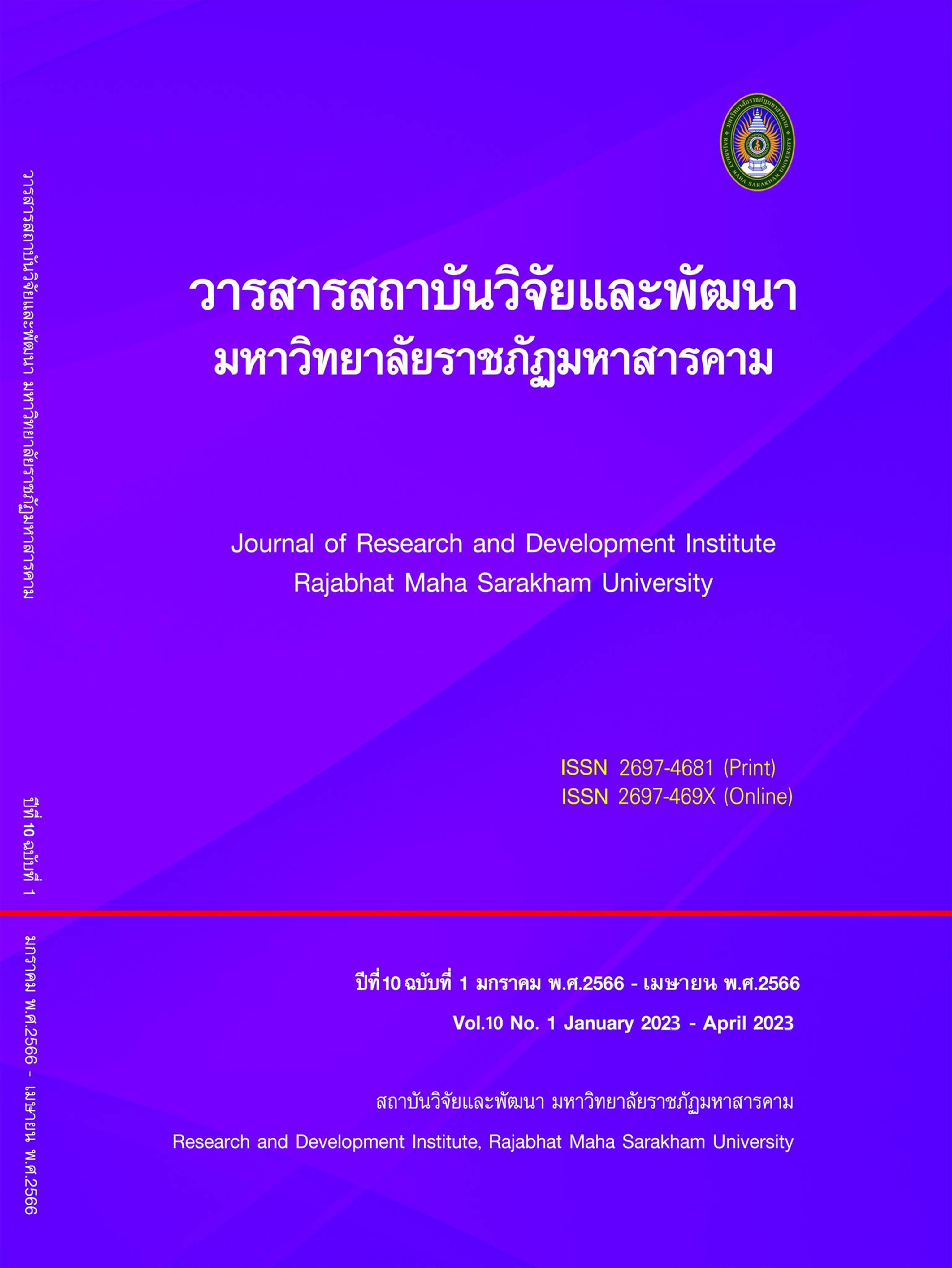การพัฒนาความเชื่อมั่นในตนเอง โดยใช้การจัดการเรียนรู้แบบ C3 Framework ร่วมกับเทคนิคห้องเรียนกลับทาง (Flipped Classroom) รายวิชา ส 32103 สังคมศึกษาของนักเรียนชั้นมัธยมศึกษาปีที่ 5 โรงเรียนมัธยมตลาดใหญ่วิทยา จังหวัดขอนแก่น
คำสำคัญ:
การจัดการเรียนรู้แบบ C3 Framework, ความเชื่อมั่นในตนเอง, เทคนิคห้องเรียนกลับทางบทคัดย่อ
การวิจัยครั้งนี้มีวัตถุประสงค์เพื่อ 1) พัฒนาความเชื่อมั่นในตนเอง โดยการจัดการเรียนรู้แบบ
C3 Framework ร่วมกับเทคนิคห้องเรียนกลับทาง(Flipped Classroom) ในรายวิชา ส 32103 สังคมศึกษา ของนักเรียนชั้นมัธยมศึกษาปีที่ 5 โรงเรียนมัธยมตลาดใหญ่วิทยา โดยนักเรียนมีคะแนนความเชื่อมั่นในตนเองเฉลี่ยรวม อยู่ในระดับมากขึ้นไป และมีจำนวนนักเรียนที่ผ่านเกณฑ์ร้อยละ 70 ขึ้นไป 2) พัฒนาผลสัมฤทธิ์ทางการเรียน โดยการจัดการเรียนรู้แบบ C3 Framework ร่วมกับเทคนิคห้องเรียนกลับทาง(Flipped Classroom) ในรายวิชา ส 32103 สังคมศึกษา ของนักเรียนชั้นมัธยมศึกษาปีที่ 5 โรงเรียนมัธยมตลาดใหญ่วิทยา โดยนักเรียนมีคะแนนเฉลี่ยผ่านเกณฑ์ร้อยละ 70 และมีจำนวนนักเรียนผ่านเกณฑ์ร้อยละ 70 ขึ้นไป กลุ่มเป้าหมายที่ใช้ในการวิจัย คือ นักเรียนชั้นมัธยมศึกษาปีที่ 5 โรงเรียนมัธยมตลาดใหญ่วิทยา สังกัดสำนักงานเขตพื้นที่การศึกษามัธยมศึกษาขอนแก่น ที่กำลังศึกษาอยู่ภาคเรียนที่ 2 ปีการศึกษา 2564 จำนวน 15 คน โดยใช้รูปแบบการวิจัยเชิงปฏิบัติการ (Action Research) เครื่องมือที่ใช้ในการวิจัยประกอบด้วย 1) เครื่องมือที่ใช้ในการทดลองปฏิบัติการ ได่แก่ แผนการจัดการเรียนรู้โดยใช้รูปแบบการจัดการเรียนรู้แบบ C3 Framework เทคนิคห้องเรียนกลับทาง(Flipped Classroom) จำนวน 9 แผน 2) เครื่องมือที่ใช้ในการสะท้อนผลการปฏิบัติการ ได้แก่ แบบบันทึกผลหลังจากการจัดการเรียนรู้ แบบสังเกตการจัดการเรียนรู้ แบบสัมภาษณ์นักเรียน แบบประเมินความเชื่อมั่นในตนเองท้ายวงจร ชนิดมาตราส่วนประมาณค่า (Rating Scale) ของ Likert แบ่งระดับเป็น 5 ระดับ รวมทั้งหมด 20 ข้อ และแบบทดสอบย่อยท้ายวงจร รูปแบบชนิดเลือกตอบ 4 ตัวเลือกจำนวน 3 วงจร วงจรละ 15 ข้อ และ 3) เครื่องมือที่ใช้ในการประเมินประสิทธิภาพการจัดการเรียนรู้ ได้แก่ แบบประเมินความเชื่อมั่นในตนเอง ชนิดมาตราส่วนประมาณค่า (Rating Scale) ของ Likert แบ่งระดับเป็น 5 ระดับ โดยทำการประเมิน 4 ด้าน รวมทั้งหมด 32 ข้อ แบบทดสอบวัดผลสัมฤทธิ์ทางการเรียน เลือกตอบ 4 ตัวเลือก มีจำนวน 45 ข้อ วิเคราะห์ข้อมูลโดยใช้ ค่าเฉลี่ย ร้อยละ และส่วนเบี่ยงเบนมาตรฐาน
ผลการวิจัยพบว่า
1) ความเชื่อมั่นในตนเอง ของนักเรียนชั้นมัธยมศึกษาปีที่ 5 ที่ได้รับการจัดกิจกรรมโดยการจัดการเรียนรู้แบบ C3 Framework ร่วมกับเทคนิคห้องเรียนกลับทาง(Flipped Classroom) ในรายวิชา ส 32103 สังคมศึกษา นักเรียนมีความเชื่อมั่นในตนเองเฉลี่ย 4.37 อยู่ในระดับ มาก และมีนักเรียนที่ผ่านเกณฑ์จำนวน 13 คน คิดเป็นร้อยละ 86.67 ซึ่งสูงกว่าเกณฑ์ที่กำหนดไว้คือนักเรียนมีคะแนนความเชื่อมั่นในตนเองเฉลี่ยรวม อยู่ในระดับมากขึ้นไป และมีจำนวนนักเรียนที่ผ่านเกณฑ์ร้อยละ 70 ขึ้นไป
2) ผลสัมฤทธิ์ทางการเรียน ของนักเรียนชั้นมัธยมศึกษาปีที่ 5 ที่ได้รับการจัดกิจกรรมโดยการจัดการเรียนรู้แบบ C3 Framework ร่วมกับเทคนิคห้องเรียนกลับทาง(Flipped Classroom) ในรายวิชา ส 32103 สังคมศึกษา มีนักเรียนได้คะแนนผลสัมฤทธิ์ทางการเรียนเฉลี่ย 34.80 คิดเป็นร้อยละ 77.33 และมีนักเรียนที่ผ่านเกณฑ์จำนวน 11 คน คิดเป็นร้อยละ 73.33 ซึ่งสูงกว่าเกณฑ์ที่กำหนดไว้คือนักเรียนมีคะแนนเฉลี่ยผ่านเกณฑ์ร้อยละ 70 และมีจำนวนนักเรียนผ่านเกณฑ์ร้อยละ 70 ขึ้นไป
เอกสารอ้างอิง
Academic Administration, Mattayomtaladyaiwittaya School. (2020). School Self- Assessment Report for the 2019 Academic Year. Mattayomtaladyaiwittaya School.
Chuasawatee, P. (2020) A Thesis for the Master of Education Program in Education in Curriculum and Instruction: The Development of Creative Problem-Solving Skills and Characteristics of Good Citizenship by Applying the C3 Learning Framework in the S31103 Social Studies Class for 10th Grade Students at Samyangwittayayon School, Si Chomphu District, Khon Kaen Province. Khon Kaen : Khon Kaen University.
Independent Committee for Education Reform (ICER). (2018). The National Education Reform Strategy/ The Independent Committee for Education Reform (ICER). Bangkok : Office of the Education Council.
Janjeawchai, P. (2019). A Thesis for the Master of Education Program in Education in Curriculum and Instruction: The Development of Problem-Solving Skills and Academic Achievements by Applying the 5 Steps Framework Together with the Flipped Classroom Model in the S31102 Social Studies Class for 10th Grade Students. Khon Kaen : Khon Kaen University.
Kulsri, N. (2011). A Thesis for the Master of Education Program in Educational Psychology and Counseling: Individual Counseling Based on Rogers’ Theory to Develop Self-Confidence Levels of Students. Khon Kaen : Khon Kaen University.
Longcharoen, N. (2011). A Thesis for the Master of Education Program in Educational Psychology and Counseling: The Results of Group Counseling Based on Rogers’ Theory to Develop Self-Confidence Levels of 9th Grade Students at Wat Klang Municipal School. Khon Kaen : Khon Kaen University.
Pahe, S. (2013). The Flipped Classroom: A New Dimension of Classroom Structures in the 21st Century. Khon Kaen : Phrae Primary Educational Service Area Office 2.
Panthong, J. (2007). A Thesis for the Master of Education Program: The Self-Confidence Levels of Children in Early Childhood Who Have Received Puppetry Storytelling. Bangkok : Srinakharinwirot University.
Piya-Atchariya, L. (1999). Units 8 – 15. In Learning Materials for the Behavioral Development of Children: The Development of Self-Confidence of Children (5th ed., pp. 569–589). Essay. Nonthaburi : Sukhothai Thammathirat Open University.
Phinla, V., &; Phinla, V. (2018). The Preparation of Social Studies Lessons in the 21st Century. Bangkok : Chulalongkorn University.
Prasithikunaporn, P. (2007). A Thesis for the Master of Education Program in Non-Formal Education: The Results of Arranging Non-Formal Educational Activities on the Self-Confidence Levels of Women in Kredtrakarn Protection and Occupational Development Center. Faculty of Education. Bangkok : Chulalongkorn University.
The Office of the National Economic and Social Development Council. (2018). 20-Year National Strategy (2018-2037). Bangkok : The Office of the National Economic and Social Development Council.
Upparamai, P. (1995). Children and Personality Development. Bangkok : Sukhothai Thammathirat Open University.
Willis, L. (1995). The Assertive Trainer: A Practical Handbook on Assertiveness for Trainers and Running Assertiveness Courses. McGraw-Hill.
ดาวน์โหลด
เผยแพร่แล้ว
รูปแบบการอ้างอิง
ฉบับ
ประเภทบทความ
สัญญาอนุญาต
ลิขสิทธิ์ (c) 2023 ทิวัตถ์ นุ่มมีศรี, อังคณา ตุงคะสมิต

อนุญาตภายใต้เงื่อนไข Creative Commons Attribution-NonCommercial-NoDerivatives 4.0 International License.
บทความที่ได้รับการตีพิมพ์เป็นลิขสิทธิ์เป็นของผู้ประพันธ์บทความ







